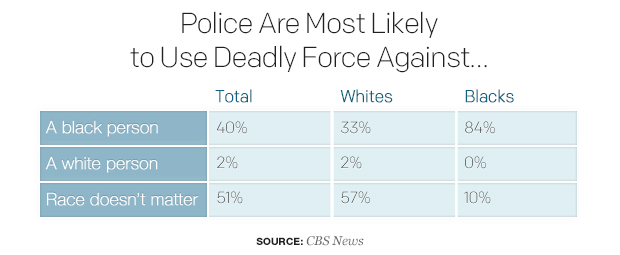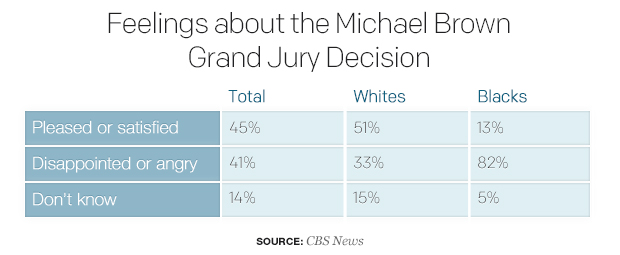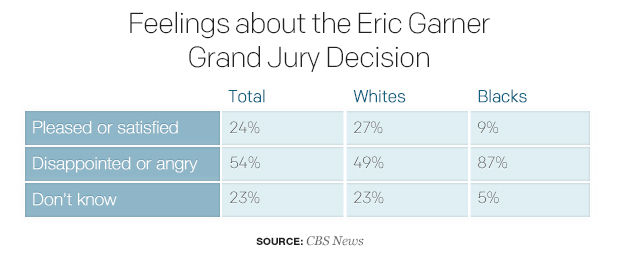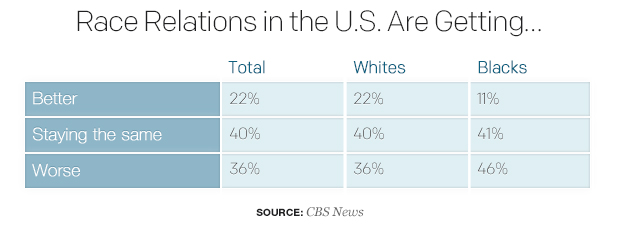Michael Brown and Eric Garner: The police, use of force and race
By Jennifer De Pinto, Sarah Dutton, Anthony Salvanto and Fred Backus
A new CBS News poll finds stark racial differences on views of the police and the deaths of Michael Brown and Eric Garner. While four in five whites say their local police make them feel mostly safe, that drops to 52 percent among blacks. Forty-three percent of African Americans say the local police make them feel mostly anxious.
Blacks and whites also hold different views on the police use of deadly force. Eighty-four percent of blacks say police are most likely to use deadly force against blacks, while most whites say race is not a factor.
More than four in five blacks are disappointed or angry about the lack of an indictment in the deaths of Michael Brown and Eric Garner. Blacks are much more likely than whites to think race played a major role in the deaths of both men.
Two-thirds of blacks think the use of deadly force in both cases was not justified, but whites see the two cases differently. Far more whites think the use of deadly force was justified in the Brown case (43 percent) than in the Garner case (14 percent).
Police: Use of Force and Race
Three in four Americans say police officers in their community make them feel safe, but whites are far more likely to feel that way than blacks. While a slim majority (52 percent) of blacks say their local police officers make them feel mostly safe, 43 percent say local police make them feel mostly anxious - compared to just 18 percent of whites who feel that way.
Whites and blacks also hold different views on the role race plays in the use of deadly force by the police. 84 percent of African-Americans think the police in most communities are more likely to use deadly force against a black person than a white person, while a majority of whites - 57 percent - think race is not a factor.
This racial divide persists on the broader question of whether police, in general, are too quick to use deadly force.
The deaths of Michael Brown and Eric Garner
Most Americans have heard or read a lot about a grand jury's decision not to indict police officer Darren Wilson in the shooting death of Michael Brown in Ferguson, Missouri, but they are divided on how they feel about it. While 45 percent of Americans say they are either pleased (19 percent) or satisfied with the decision (26 percent), nearly as many - 41 percent - say they are either disappointed (28 percent) or angry (13 percent).
Blacks and whites see things differently. Fifty-one percent of whites are at least satisfied with the decision, while 82 percent of blacks say they are disappointed (55 percent) or angry (27 percent).
Forty-three percent of whites think the shooting of Michael Brown was justified, while another 35 percent don't know enough to say. In contrast, 64 percent of blacks think the shooting was not justified.
Fewer Americans (39 percent) have heard or read a lot about another grand jury decision not to indict police officer Daniel Pantaleo in the death of Eric Garner in Staten Island, NY, though they are much more critical of the grand jury's decision in this case. Fifty-four percent of Americans are either disappointed (35 percent) or angry (19 percent) with the lack of an indictment. Among blacks, 87 percent are disappointed (51 percent) or angry (36 percent).
Just 14 percent of whites and even fewer blacks (3 percent) think the use of force by police that brought about Garner's death was justified. Two-thirds of blacks (68 percent) think it was not justified, while many whites (46 percent) don't know enough to say.
Many Americans think race played a role in the deaths of both men, both of whom were black and the police officers involved were white. But blacks are far more likely to think it played a major role. Whites are more likely to say race was not a factor.
In the aftermath of the grand jury decisions in the Brown and Garner cases, 49 percent of Americans think an independent prosecutor should handle cases involving police and civilian deaths, while 39 percent think local district attorneys should handle them. A majority of African Americans think these cases should be handled by an independent prosecutor.
Profiling and Discrimination
Majorities of Americans, including both blacks and whites, think police officers stop people of certain racial or ethnic groups because they think they are more likely than other groups to commit crimes.
On a more personal level, African-Americans are far more likely than whites to say they have been subject to police discrimination because of their race. 54 percent of blacks - and 66 percent of black men - say they have personally been discriminated against by the police, compared to just 10 percent of whites.
Police: Controlling Crime, Training, and Equipment
Overall, Americans give police in their community positive marks for controlling crime, but most blacks--61 percent--on the other hand, say their local police do just a fair or poor job handling crime in their area, where 69 percent of whites think their local police do a pretty good or excellent job of controlling crime.
In order to help ease tensions and disputes between police and civilians, some have proposed better training of police and police use of body cams. The poll finds broad support for both of these approaches, including majorities of both blacks and whites.
Six in 10 Americans think police officers need better training to help handle confrontations with civilians, while a third think most police have this training already. Blacks (85 percent) are more likely than whites (59 percent) to support better police training. There is near unanimous support (91 percent) for on-duty police officers wearing video cameras.
In addition to more training and body cameras, half of Americans think a police department that reflects the racial make-up of its community is a good idea. Most blacks - 63 percent - think this should be the case, but whites are divided.
There is public opposition to local police forces having military-style armored vehicles and assault weapons - similar to the kind of equipment that was used by police in Ferguson Missouri in August, with 65 percent of Americans overall opposing the arming of their local police with military weapons and vehicles.
Race Relations in the U.S.
Americans divide in their assessments of race relations in the U.S: 45 percent think they are generally good, but 43 percent think they are generally bad. Views are similar to August - when protests in Ferguson first began after Michael Brown's death - but the percentage who says race relations are good has dropped 10 points since the spring and is now the lowest in CBS News Polls since 1997.
Blacks are more critical than whites. Fifty-four percent of blacks think race relations are bad, while whites are more divided.
Only one in five Americans thinks race relations are improving in the U.S. Most either think they are getting worse (36 percent) or staying about the same (40 percent).
On a more positive note, Americans - both black and white - rate race relations in their own neighborhood much more positively than they rate it in the country as a whole. 78 percent say race relations in their community are good, including 80 percent of whites and 66 percent of blacks.
_____________________________________________________________________________
This poll was conducted by telephone December 6-9, 2014 among 1,122 adults nationwide. Data collection was conducted on behalf of CBS News and the New York Times by SSRS of Media, PA. Phone numbers were dialed from samples of both standard land-line and cell phones.
Additional interviews were conducted with African Americans, who had previously completed a survey as part of a random sample, to yield a sample size of 287 African Americans. 698 whites were interviewed.
The combined African American and non-African American samples were weighted separately to match their group's population characteristics such as gender, age, education, region, marital status and phone use based on recent U.S. Census estimates. The samples were then combined and weighted to the total U.S. adult population.
The error due to sampling for results based on the entire sample could be plus or minus four percentage points. The error for subgroups may be higher. The margin of error for the sample of whites is 5 pts and 8 pts for African Americans. Interviews were conducted in English and Spanish. This poll release conforms to the Standards of Disclosure of the National Council on Public Polls.





